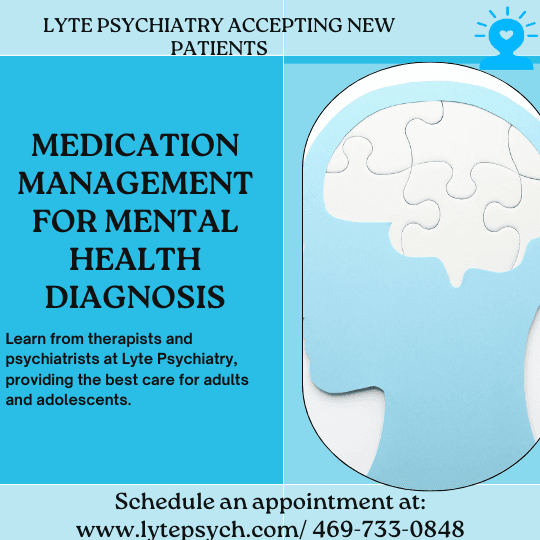Thu May 30 2024
Medication Management for Mental Health Diagnosis Essential Guide from Therapists and Psychiatrists from Lyte Psychiatry (Best Adults and Adolescents Therapist and Psychiatrist) Dallas, Fort Worth, TX

Medication Management for Mental Health Diagnosis Essential Guide from Therapists and Psychiatrists from Lyte Psychiatry (Best Adults and Adolescents Therapist and Psychiatrist)
Managing mental health can be a complex journey, often requiring a multifaceted approach. Medication management is a crucial component, especially for individuals diagnosed with conditions such as depression, anxiety, bipolar disorder, and schizophrenia. At Lyte Psychiatry, therapists and psychiatrists work collaboratively to provide comprehensive care, ensuring patients receive the most effective and individualized treatment plans.
Understanding Medication Management
The Role of Medication in Mental Health Treatment
Medications can significantly improve symptoms and quality of life for individuals with mental health conditions. They can help stabilize mood, reduce anxiety, alleviate depression, and manage psychotic symptoms. However, finding the right medication and dosage often requires patience and regular monitoring.
Types of Medications Commonly Prescribed
Antidepressants: Used primarily to treat depression and anxiety disorders.
Antipsychotics: Effective for managing symptoms of schizophrenia and bipolar disorder.
Mood Stabilizers: Commonly prescribed for bipolar disorder to prevent mood swings.
Anxiolytics: Help reduce severe anxiety and panic attacks.
Stimulants: Often used for attention-deficit/hyperactivity disorder (ADHD).
Working with Your Psychiatrist at Lyte Psychiatry
Initial Assessment and Diagnosis
The first step in medication management is a thorough assessment by a psychiatrist. This evaluation includes a detailed medical history, a review of symptoms, and possibly some diagnostic tests. The goal is to develop a comprehensive understanding of the patient's condition to inform the treatment plan.
Developing a Personalized Treatment Plan
Based on the initial assessment, the psychiatrist will recommend a treatment plan tailored to the individual's needs. This plan often includes medication, therapy, lifestyle changes, and regular follow-ups to monitor progress and adjust the treatment as necessary.
The Importance of Adherence in Medication Management
Why Following Your Prescription Matters?
Adherence to the prescribed medication regimen is crucial for its effectiveness. Skipping doses or stopping medication abruptly can lead to relapse or worsening of symptoms. Patients should communicate openly with their healthcare providers about any side effects or concerns to adjust the treatment plan accordingly.
Tips from Lyte Psychiatry for Staying on Track
Use a Medication Organizer: Helps in keeping track of daily doses.
Set Reminders: Alarms on phones or apps can remind patients to take their medication.
Regular Follow-ups: Scheduled appointments with the psychiatrist ensure the treatment remains effective and safe.
Monitoring and Managing Side Effects
Common Side Effects and How to Handle Them
Medications for mental health conditions can have side effects, which may vary depending on the individual and the type of medication. Common side effects include drowsiness, weight gain, and gastrointestinal issues. Patients should report any side effects to their psychiatrist, who can adjust the dosage or switch to a different medication if necessary.
When to Seek Immediate Help
Some side effects may require immediate medical attention, such as severe allergic reactions, extreme changes in mood, or suicidal thoughts. Patients should have a clear understanding of which symptoms warrant a prompt response and have a plan in place for seeking help.
The Role of Therapists in Medication Management
Integrating Therapy with Medication
Therapists play a vital role in supporting patients who are on medication. They provide psychotherapy, which can enhance the effectiveness of medications by addressing underlying psychological issues. Cognitive-behavioral therapy (CBT), for example, is often used alongside medication to treat depression and anxiety disorders.
Lifestyle Factors in Medication Management
Diet and Nutrition: A balanced diet can influence the effectiveness of medication and overall mental health. Certain foods and supplements may interact with medications, so it’s important to discuss dietary habits with a healthcare provider.
Exercise and Physical Activity: Regular physical activity can improve mood and reduce symptoms of depression and anxiety. Exercise may also help mitigate some medication side effects, such as weight gain.
Sleep Hygiene: Good sleep hygiene is crucial for mental health. Many psychiatric medications can affect sleep patterns, so maintaining a regular sleep schedule and creating a restful environment can support overall treatment.
Seeking Professional Help at Lyte Psychiatry ( Best Adults and Adolescents Therapist and Psychiatrist), Dallas, TX
Medication management is a critical component of mental health treatment, requiring collaboration between patients, psychiatrists, and therapists. At Lyte Psychiatry, our team is dedicated to providing personalized, comprehensive care to help patients achieve optimal mental health outcomes.
To Schedule an appointment. Click Here
To see our services. Click Here
Call us if you have questions at 469-733-0848
FAQs
Q: What is the first step in medication management for mental health?
A: The first step is a thorough assessment by a psychiatrist to diagnose the condition and develop a personalized treatment plan.
Q: How do I know if my medication is working?
A: Patients should monitor their symptoms and communicate regularly with their psychiatrist. Improvement in symptoms typically indicates that the medication is effective.
Q: What should I do if I experience side effects from my medication?
A: Report any side effects to your psychiatrist. They can adjust the dosage or switch to a different medication to reduce or eliminate side effects..
Q: Are there lifestyle changes that can support my medication treatment?
A: Yes, a balanced diet, regular exercise, and good sleep hygiene can enhance the effectiveness of your medication and overall mental health.